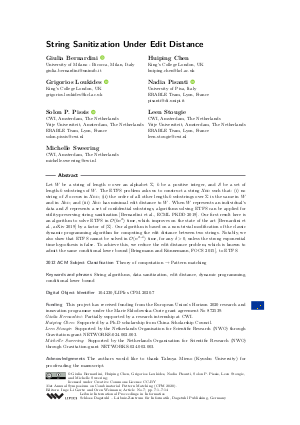@InProceedings{bernardini_et_al:LIPIcs.CPM.2020.7,
author = {Bernardini, Giulia and Chen, Huiping and Loukides, Grigorios and Pisanti, Nadia and Pissis, Solon P. and Stougie, Leen and Sweering, Michelle},
title = {{String Sanitization Under Edit Distance}},
booktitle = {31st Annual Symposium on Combinatorial Pattern Matching (CPM 2020)},
pages = {7:1--7:14},
series = {Leibniz International Proceedings in Informatics (LIPIcs)},
ISBN = {978-3-95977-149-8},
ISSN = {1868-8969},
year = {2020},
volume = {161},
editor = {G{\o}rtz, Inge Li and Weimann, Oren},
publisher = {Schloss Dagstuhl -- Leibniz-Zentrum f{\"u}r Informatik},
address = {Dagstuhl, Germany},
URL = {https://drops.dagstuhl.de/entities/document/10.4230/LIPIcs.CPM.2020.7},
URN = {urn:nbn:de:0030-drops-121324},
doi = {10.4230/LIPIcs.CPM.2020.7},
annote = {Keywords: String algorithms, data sanitization, edit distance, dynamic programming, conditional lower bound}
}

 Creative Commons Attribution 3.0 Unported license
Creative Commons Attribution 3.0 Unported license






















